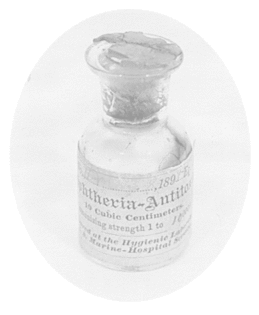Diphtheria
Diphtheria is an upper respiratory tract illness characterized by sore throat, low-grade fever, and an adherent membrane of the tonsil(s), pharynx, and/or nose. A milder form of diphtheria can be limited to the skin. It is caused by Corynebacterium diphtheriae, an aerobic Gram-positive bacterium. more...
Diphtheria is a highly contagious disease spread by direct physical contact or breathing the secretions of those infected. Diphtheria was once quite common, but has now largely been eradicated in developed nations (in the United States for instance, there have been fewer than 5 cases a year reported since 1980, as the DPT (Diphtheria-Tetanus-Pertussis) vaccine is given to all school children). Boosters of the vaccine are recommended for adults because the benefits of the vaccine decrease with age; they are particularly recommended for those travelling to areas where the disease has not been eradicated yet.
Signs and symptoms
The respiratory form has an incubation time of 1-4 days. Symptoms include fatigue, fever, a mild sore throat and problems swallowing. Children infected have symptoms that include nausea, vomiting, chills, and a high fever, although some do not show symptoms until the infection has progressed further.
Low blood pressure may develop in some patients. Longer-term effects include cardiomyopathy and peripheral neuropathy (sensory type).
Diagnosis
Laboratory criteria
- Isolation of Corynebacterium diphtheriae from a clinical specimen, or
- Histopathologic diagnosis of diphtheria
Case classification
- Probable: a clinically compatible case that is not laboratory confirmed and is not epidemiologically linked to a laboratory-confirmed case
- Confirmed: a clinically compatible case that is either laboratory confirmed or epidemiologically linked to a laboratory-confirmed case
Empirical treatment should generally be started in a patient in whom suspicion of diphtheria is high.
Treatment
The disease may remain manageable, but in more severe cases lymph nodes in the neck may swell, and breathing and swallowing will be more difficult. People in this stage should seek immediate medical attention, as obstruction in the throat may require a tracheotomy. In addition, an increase in heart rate may cause cardiac arrest. Diphtheria can also cause paralysis in the eye, neck, throat, or respiratory muscles. Patients with severe cases will be put in ICUs (Intensive Care Units) at hospitals and be given a diphtheria anti-toxin and bactericidal drugs such as penicillin and erythromycin. Bed rest is important and physical activity should be limited, especially in cases where there is inflammation of the heart muscles. Recovery is generally slow.
Epidemiology
Diphtheria remains a serious disease, with 5-10% percent fatality and up to 20% in children younger than 5 or adults older than 40. Outbreaks, though very rare, still can occur worldwide, even in developed nations. After the breakup of the old Soviet Union in the late 1980s, vaccination rates fell so low that there was an explosion of diphtheria cases. In 1991 there were 2,000 cases of diphtheria in Russia and its newer independent states. By 1998 there were as many as 200,000 cases, with 5,000 deaths, according to Red Cross estimates. This was so great an increase that it was cited in the Guinness Book of World Records as "most resurgent disease".
Read more at Wikipedia.org



